
“In times of disrupted supply chains, excessive raw material prices and increasing sustainability requirements, it is high time to reorient ourselves,” says Martina Bandte, President of Gesamtmasche. “Uzbekistan can play an important role for us in the coming years.”
Association partnership launched
GESAMTMASCHE and UZTEKSTILPROM are intensifying their cooperation with a cooperation agreement and a concrete catalogue of measures: The focus is on direct business contacts, the training and further education of specialists and cotton and textile production according to ecological and social standards. The associations are supported by a partnership programme of the Federal Ministry for Economic Cooperation and Development, which is being implemented with the development organisation sequa.
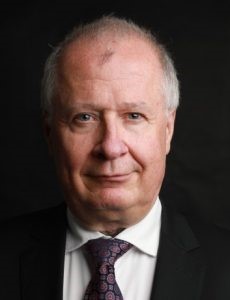 “This takes our cooperation to a new level,” says Ilkhom Khaydarov, President of UZTEKSTILPROM. “Uzbekistan gets the chance to become an internationally recognized industry player. A further important element is also the customs advantages granted by the EU under the GSP+.”
“This takes our cooperation to a new level,” says Ilkhom Khaydarov, President of UZTEKSTILPROM. “Uzbekistan gets the chance to become an internationally recognized industry player. A further important element is also the customs advantages granted by the EU under the GSP+.”
Photo: © German Embassy Tashkent
“Uzbekistan is rapidly advancing the modernization and expansion of the economy. This also and above all applies to the textile industry. This creates a wide range of business opportunities for the German textile industry. I am therefore pleased about the partnership between Gesamtmasche and Uztekstilprom. It makes the connection between our countries closer and opens doors at the right time.”
Dr. Tilo Klinner, Plenipotentiary and Ambassador Extraordinary to Uzbekistan
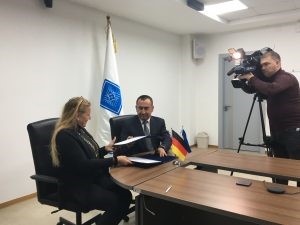 GESAMTMASCHE President Martina Bandte and UZTEKSTILPROM President Ilkhom Khaydarov sign an association cooperation agreement, Picture: © Gesamtmasche
GESAMTMASCHE President Martina Bandte and UZTEKSTILPROM President Ilkhom Khaydarov sign an association cooperation agreement, Picture: © Gesamtmasche
First Fact Finding Tour
At the beginning of November, GESAMTMASCHE travelled with a delegation of ten entrepreneurs to Tashkent and the Fergana Valley and visited eleven Uzbek companies at various stages of the value chain from yarn to ready-to-wear.
“We were very impressed by the state-of-the-art facilities and the spirit of optimism among Uzbek entrepreneurs,” said GESAMTMASCHE President Martina Bandte, “and also by the consistency with which Uzbekistan has combated and eliminated the problem of child and forced labour.”
In the last five years, Uzbek companies have invested over $600 million in new equipment. The majority of the purchased machines come from Germany and Switzerland. The certification of the production, starting with the cotton field, has already been started. The initiatives of GIZ and the World Bank also contribute to this. So far, however, only six companies in Uzbekistan have been GOTS-certified. After all, twelve already have BSCI certification, seven at Sedex. After all, 45 companies can boast the OEKO-TEX® Standard 100. “Verifiable sustainability and transparency are among our core goals,” emphasizes Association President Khaydarov. “However, the certification process takes a lot of time. By next year, the number of certified companies is likely to have doubled.”
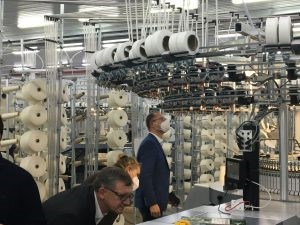
Newly installed circular knitting shop in the Global Textile business cluster, Fergana. Organic cotton will soon also be processed here – from the cluster’s own cultivation in the region; Photo: © Gesamtmasche.
Reforms and industry growth at a rapid pace
“The government under President Mirsijojew has been reforming the economy at a breathtaking pace since 2017,” says Dr. Uwe Strohbach, Central Asia expert at Germany Trade & Invest (GTAI). “The country is becoming an international industry hotspot. The textile and clothing industry is one of the top investment sectors in the manufacturing sector.” In the cotton sector, Uzbekistan already has a fully integrated production chain. In recent years, textile exports have been systematically expanded. Practically the entire Uzbek cotton harvest is already spun domestically. No other cotton country has achieved this in the last 25 years. In 2020, Uzbekistan exported textile goods worth 1.9 billion US dollars – 125 percent more than in the previous year. Finished goods accounted for just over half of textile exports. For 2021, Uzbekistan is aiming for an ambitious export target of 3 billion US dollars. While there were only 15 cotton textile clusters in 2018, there were already 122 at the end of August 2021.
Location factors at a glance
With 35 million inhabitants, Uzbekistan is the most densely populated country in Central Asia. As a particular geographical advantage, Uzbekistan is the only country in the region that shares borders with all other Central Asian countries. This is a good starting point for the development into a regional economic centre and transport hub. The logistical connection to Europe is also good: freight by truck to Germany has a duration of about 14 days. The population is young and growing dynamically with an annual increase of 600,000 people. 57 percent of the inhabitants are under 30 years old. The supply of young, willing to learn and motivated workers is correspondingly large, while the wage costs are low. How successfully the restructuring plans in the textile industry can be implemented, however, is not certain: While the production of standard raw materials on modern plants can prove to be efficient in high volumes, there is a lack of diversification in the subsequent stages.
“Cheap mass production is no longer a concept for the European market. Flexibility, small batch sizes and speed are required here,” says Martina Bandte. It remains to be seen whether the Uzbek middle class will have the opportunity to distinguish themselves alongside – or with – the large clusters. The potential is there.

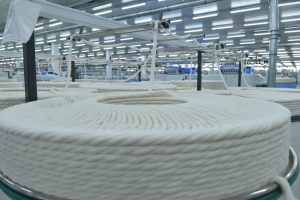
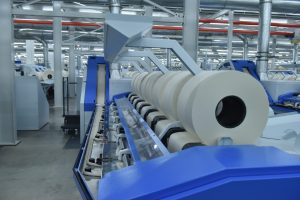
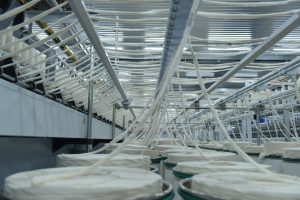
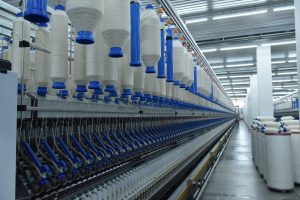
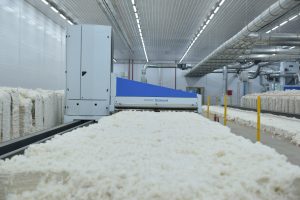
Photos: © Uztex
Still little noticed by Europe’s textile industry, Uzbekistan is experiencing a small revolution. Production is modern, and child and forced labour in the cotton fields has disappeared.
Uzbekistan has succeeded in eradicating forced and child labour during the 2021 cotton production cycle, according to new ILO findings.